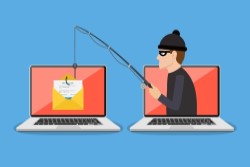|
Meta description: Cybercrime is on the rise. We've put together some tips to help you protect yourself from scammers in the online world. Check Out The Grammar Report Here. |
As the world continues to digitize, more and more of our information is stored online, which increases the likelihood of hacking and other breaches. If you're like most people, you're probably fed up with all the constant news about hacking and identity theft. You may be wondering, "What can I do to protect myself? You are right to be concerned. The U.S. Department of Justice (DOJ) estimates that 47% of people in the U.S. have had their identities stolen or compromised in the past five years alone. . The good news is that you can take steps to protect your identity from hackers and scammers. In this blog, we'll tell you everything you need to know about phishing scams and how to avoid them.
What exactly is a phishing scam?

Phishing emails often look like real letters from real companies requesting personal information. They may come from your bank or credit card company, or even tax or government agencies. Phishing emails often contain urgent requests for action, followed by links to fake websites designed to trick you into revealing personal information.
Tips to protect yourself from hacking and phishing scams
Here are some sure-fire ways to avoid phishing scams:
Use antivirus software and a firewall.
The first line of defense against hackers is to protect your computer. One way is to install antivirus software and always keep it up to date. You can also use a network security system to create a barrier between your information and intruders. Using a firewall makes it harder for hackers to access your systems and information.
know what you're dealing with
If that sounds too good to be true, it is. If you receive an email from someone claiming to have provided you with funds, think twice before clicking any link in the email. Be wary of unsolicited offers, and always double-check the sender's email address for misspellings and unusual characters.
Never click on links from unverified sources
Whether you receive an email, text message or other form of communication, do not click on any links unless you are 100% sure they are valid. If you receive suspicious information from someone asking for your personal information, don't reply, especially if the information claims to be from your bank or credit card company. Instead, contact the agency directly using a trusted phone number or website address.
Update your browser

Always download the latest security updates for your web browser. This ensures you have the latest protection against phishing sites.
Install Anti-Phishing Toolbar
Phishing scams are one of the most common ways hackers access personal information and are becoming increasingly difficult to detect. The Anti-Phishing Toolbar identifies known phishing sites and warns you when you try to visit a site. It also verifies the authenticity of a website by comparing it to known phishing sites.
Take away
There are a lot of phishing scams out there, and we definitely don't want you to be a victim. The most important thing to protect yourself from hackers is to stay up to date: check regularly for security updates and don't click on suspicious links or attachments. The tips highlighted here may not be a 100% panacea to protect you, but they are a good place to start. So keep this in mind as you browse the internet and you will be protected from common pitfalls lurking in the online world!